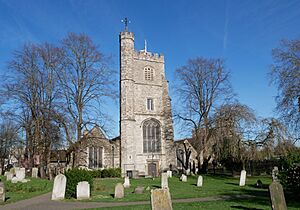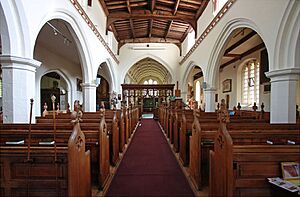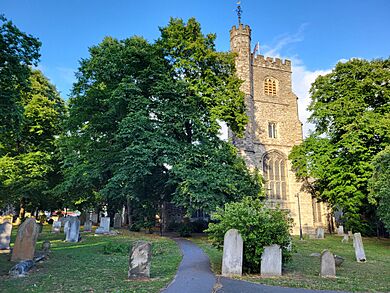St Margaret's Church, Barking facts for kids
Quick facts for kids St Margaret's Church, Barking |
|
|---|---|

West face of the Church
|
|
| 51°32′7.89″N 0°4′33.6504″E / 51.5355250°N 0.076014000°E | |
| OS grid reference | TQ 44065 83891 |
| Location | Barking, Barking and Dagenham |
| Country | England |
| Denomination | Church of England |
| Churchmanship | Anglo-Catholic & open evangelical |
| History | |
| Status | Active |
| Dedication | Margaret the Virgin |
| Events | 1215: Foundation 1762: Marriage of Captain James Cook to Elizabeth Batts |
| Architecture | |
| Functional status | Parish church |
| Heritage designation | Grade I listed |
| Specifications | |
| Length | 134 feet (41 m) |
| Width | 64 feet (20 m) |
| Height | 75 feet (23 m) |
| Bells | 8 |
| Tenor bell weight | 23 long cwt (2,600 lb or 1,200 kg) (heaviest) |
| Administration | |
| Parish | Barking |
| Deanery | Barking |
| Archdeaconry | Archdeaconry of Barking |
| Episcopal area | Barking Episcopal Area |
| Diocese | Diocese of Chelmsford |
| Province | Province of Canterbury |
St Margaret's Church, also known as the Church of St Margaret of Antioch, is a historic Church of England parish church in Barking, East London. A parish church is the main church for a local area. This building is very important, so it is a Grade I listed building. This means it is protected because of its special history.
The church stands on a site that has been used for worship since the 1200s. It is located in the grounds of Barking Abbey, which was once a royal monastery. The church is named after Margaret the Virgin, a Christian saint.
Contents
History of the Church
Medieval Times
The church started as a small chapel for the local people of Barking. It was built next to the much larger Barking Abbey. The oldest part of the church you can still see today is the chancel (the area around the altar), which was built in the early 13th century.
In 1300, the chapel officially became a parish church. For many years, a chaplain from the Abbey led the church services. The tall bell tower that stands today was added in the late 15th century.
Changes After the Reformation
During the 16th century, a big change called the Dissolution of the Monasteries happened in England. The King closed Barking Abbey, but St Margaret's was allowed to stay open as a parish church.
Ownership of the church passed to the King. Later, it was bought and given to All Souls College, Oxford. In return, the church had to do several things. The vicar had to pray for the man who provided the money, give money to poor people once a year, and help pay for two students at the college.
From the 1600s to the 1900s
Inside the church, there are several memorials to important people. One is for Charles Montagu, a politician from the 17th century.
A very famous event happened here on 21 December 1762. The great explorer Captain James Cook married a local woman named Elizabeth Batts in this church.
Over the centuries, the church has been repaired and restored. Between 1929 and 1936, the inside of the church was carefully restored. In the late 20th century, a new section was added to the side of the church. This new part has an office, a bookshop, and a small cafe.
The Church Today
St Margaret's is an active and busy church. For a while, it was part of a "team parish" with two other local churches, Christ Church and St Patrick's. Since 2017, all three churches have their own separate parishes again.
One unusual thing about St Margaret's is that it has three churchwardens instead of the usual two. Churchwardens are volunteers who help run the church.
The church has different styles of worship. It is described as both Anglo-Catholic and open evangelical. This means it combines traditional ceremonies with modern, relaxed services to welcome everyone.
In 2007, a special sculpture was placed in front of the church. It was made from two stones that were once part of the old medieval London Bridge.
Famous People and Events
Famous Marriages
The most famous wedding at St Margaret's was between Captain James Cook and Elizabeth Batts. Captain Cook was a world-famous explorer and map-maker for the navy. Elizabeth's father was the owner of an inn and one of Cook's early supporters.
Interesting Burials
Several notable people are buried at St Margaret's Church.
- Daniel Day (1682–1767): He was famous for starting the Fairlop Fair. He was buried in a special coffin made from a large branch that fell from his favourite tree, the Fairlop Oak.
- Henry Fanshawe: He was a member of the English Parliament during the time of Queen Elizabeth I.
- Sir Charles Montagu (c.1564–1625): He was a politician. There is a monument to him on the church wall. It shows a small statue of him in a military tent. The inscription says he died in 1625 and gave forty pounds to the poor people of Barking, which was a lot of money back then.
Notable Clergy
Many vicars (priests in charge of a parish) from St Margaret's have become well-known. Some have even become bishops, who are senior leaders in the church. For example, Hugh Jermyn served here before becoming a bishop in Sri Lanka and Scotland. Hensley Henson was vicar here before becoming the Bishop of Durham. More recently, Trevor Mwamba was the vicar from 2013 to 2019, after serving as the Bishop of Botswana.
 | Percy Lavon Julian |
 | Katherine Johnson |
 | George Washington Carver |
 | Annie Easley |



